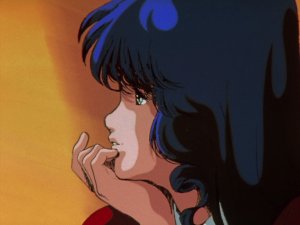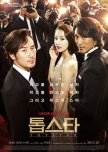
Yet when those dreadful expectations of mine were ultimately dashed, it still surprised me. What I had just encountered was somehow much better than initially imagined. You see, I had the impression Top Star would be a seedy melodrama or, at best, one of those dank and miserable discourses on the evils of celebrity. This film could be described instead as a character study and human drama: the bittersweet tale of two flawed men and their wildly unbalanced friendship. If you like western film, you might compare this one to The Talented Mr. Ripley with Matt Damon and Jude Law (or other adaptations of the same). Instances of deja vu were undeniable.
Most impressive about the execution of Top Star must be the fact it was not at all over the top. Its characters are very human and dark in the way people sometimes are, especially the privileged or overly ambitious among us. They have both good points and bad, but the things they do are not outside the realms of reality. Of course, fame does play a role in events depicted in the film; however, it is neither deified nor demonized. Rather, celebrity is measured by the quality of the person wielding it—and the choices they make, while possessing it.
Two men share the screen in Top Star: Kim Min Joon and Uhm Tae Woong. Between the two, despite being a fan of the latter, the former captivated me most. Min Joon looks the part of an A-Lister, switching between masks of charm and thoughtlessness without difficulty. He can be warm or hateful, desolate or bright, all with surprising depth. Uhm Tae Woong isn’t called “Uhm-force” for nothing, though; he stood on equal footing with his co-star. I’m a little used to his goody-two-shoes image from dramas, but in film he seems to spread his wings a little more. The Tae Shik character was “nobody” reaching toward the stars, but I believed him completely…even if it was strange to see this “top star” playing such a role. Great chemistry between the two, with an okay check-in by So Yi Hyun as the less developed Mi Na.
Top Star has such a lovely soundtrack; I enjoyed how well its various tracks were interspersed between stretches of silence. Many interesting cinematographic sequences stood out in no small part to the accompanying auditory cues. Some viewers may like the rendition of “You Were Always on My Mind” and its off-vocal insertion a little less. However, as time rolls along and one takes the lyrics out of context, the usage suddenly makes sense. I liked its unique orchestration anyway; it may not be the original, but it’s still pretty nice.
Please note the crisp and pretty cinematography as a whole. Everything looked gorgeous and glitzy, from the surroundings to the main cast. There are a couple cameos near the beginning, too: who can you spot?
Was this review helpful to you?
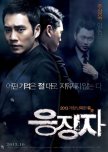
We start with a strong premise, and the initial twenty minutes are particularly promising. A good chunk of the emotional foundation is established after that point. From here, the story primarily deals with the troubled lead character and his actions once fate brings before his high school bully as an adult. What I enjoyed most about this film how human Joon Seok was; he was no mastermind or powerfully connected avenging knight. His pain was real and easy to connect with. There are also real instances of suspense, though mostly near the end; most of the intensity comes from the disturbing nature of the content.
Unfortunately, the middle sections of The Punisher are somewhat meandering and reliant on coincidence; certain events rely on the character knowing just how an event will play out. All but the lead actors play bare shadows. Several actors and actresses come and go in the narrative, serving more expositional purpose than anything else. As such, it’s hard to get a real feel for their talents, or even the real importance of their characters.
Joo Sang Wook often portrays dapper authoritarians, a fact he has frequently lamented in the media. Perhaps some of that irritation will now subside, because his Joon Seok is a wholly different animal. Of hollow eye and haunted expression, this character has barely held it together since his hellish teenage years. He is anything but suave here, barely recognizable; of particular note must be the scene in which Joon Seok first sees his tormentor again as an adult. The pure fear and honest trauma is just flooring. Our other lead, Yang Dong Geun, portrays the utterly despicable Chang Sik. Unfortunately, The Punisher marks the first time I've seen this actor; the frightening portrayal will not be soon forgotten.
A quick honorable mention to Kim Kwon as the young Joon Seok: he single-handedly set the atmosphere for the entire film with a nervous laugh. His is a career to watch.
While watching the music is noticeable, in a good way. Heart-thumping tracks, others which will keep the viewer on the edge of their seats, tragic and wordless vocals. My favorite is the ballad covering the credits; after the effects of the film, the results were chilling. Otherwise, nothing to add to the old MP3 player.
Was this review helpful to you?
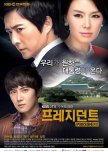
While a good portion of President does revolve around politics and the campaigning process, much more can be seen than that. After all, this is the tale of deep and involving characters, each with their own fleshed out philosophies, backgrounds, and behaviors. These deal with and engage in various conflicts and intrigues, some scandalous, some campaign-crushing, others life-ruining. So what does such an atmosphere produce? High stakes conflict, with constant twists and turns. The viewer never knows what might come out of various happenings, even until the end. There were times I held my breath, totally drawn in, or even cried, having become so involved in this bitter battle.
Another strength rests in dialogue, a major point for scriptwriters. Much like in another surprisingly fetching drama (Empire of Gold), conversations are strong and memorable, if not as literary. Several speeches served up goose bumps, especially those delivered by Jang Il Joon (Choi Soo Jong).
Despite the deep praise I have for much of President, problems do exist in the narrative. There were times, if only on occasion, I found certain events unbelievable or a little “too much.” More serious might actually be the inclusion of Yoo Min Ki (Kim Jay), and the overall pacing of that character’s subplot. Two romances exist on top of this, yet only one works well; the other feels shoe-horned in to hook unsuspecting romance fans.
Acting! Why not start with the best? Jang Il Joon might be one of the most fascinating characters ever written for a drama, and Choi Soo Jong brings him to life with overflowing charisma. Is this a good man, a bad one, or a bit of both? This unforgettable portrayal deepens as our knowledge of Jang Il Joon does – and what an electrifying effect! His voice especially gave me the impression of a true leader; I could listen to this man speak all day, yet always be moved.
Other fine performances belong to Ha Hee Ra (as the deliciously complicated, unscrupulous Jo So Hee) and Kim Heung Soo (brilliant advisor Ki Soo Chan). The majority of Jang Il Joon’s competitors and campaign workers were great too, though particularly Hong Yo Seop (playing noble Kim Kyung Mo). I honestly wanted to give this section a perfect score, but unfortunately several young cast members prevented me. These include Kim Jay and Wang Ji Hye as the biggest offenders, but their scenes are mercifully short in comparison to the rest.
Two great vocals are provided by Super Junior (“Biting My Lips”) and 4MEN (“To Go and Die Alone”) respectively. This second touched me the most; its lyrics suit Jang Il Joon and his upward struggle to a magnificent degree. Otherwise, most incidental music worked fine or was at least unobtrusive, though both the “love ballad” and campaigning tracks were not to my taste.
Was this review helpful to you?
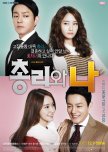
“Charming” describes much of this series well. Contract marriages are nothing new to our beloved world of dramas; surely, viewers could also point out dozens where the unavoidable presence of an outsider begins to positively affect a fractured family. But what made Prime Minister and I quite nice was not any presumption of originality, but rather its lighthearted, laid-back shuffle of quirk and classic cliches.
Pacing between dramatic, romantic, and comedic elements typically held up well. There was even a refreshing honesty between characters and even quickness of resolution that I rather enjoyed. Da Jung (Yoona) interacted so naturally with Kwon Yul (Lee Bum Soo) and his children; this entire group of characters were a joy to watch, especially together. Early episodes might have exhibited cinematographic awkwardness, but any such issue was quickly ironed out. Basically, until the final episodes, few problems presented themselves.
All that changed with the poor handling of a certain plot point. As a result, the last three or so episodes seemed to develop anemia. The innate charm still existed, but the drama became paler, poorer, and less fun. This happened to various characters as well. One moment had me sad the series was ending, the next wondering what went wrong with the basic rhythm of the show. Even with this unfortunate turn of events, Prime Minister and I stayed cute and entertaining for most of its run. Even with the big anti-climactic "blah," I have no regrets having watched it to completion.
Lee Bum Soo has often been described to me in glowing terms. It’s shameful, but this is actually my first encounter with him. But what an impression he made! His Kwon Yul felt fully realized and remarkably attractive, despite being depicted as a little stiff and unbending by the writing. Warmth and gravity is important for romantic leads, and he delivered well. Leading lady Yoona generates controversy whenever the subject of her acting pops up. Many say she improved from previous encounters, but my own inexperienced commentary to this point would be useless. For the most part, I found her Da Jung likable and found no real problems with the portrayal. She worked well with Lee Bum Soo; there *was* chemistry, just the quiet sort. Scant physical contact, as well as script failings, dashed the potential in this case.
Yoon Shi Yoon broke my heart somewhat. Not because of anything that befalls his Kang In Ho, but rather the role itself. Character trajectory makes it difficult to like or sympathize with him much, even though the actor looks great and performs well. Ryu Jin (Park Joon Ki) is also gorgeous and caught my eye more often than not, but suffered from the same problems. Returning to the positive, all three child actors were not only perfectly adorable, but competent as well. Little Lee Do Hyun as Man Se, need I say more?
Several instrumentals caught my ear over the course of Prime Minister and I, but truly memorable tracks landed with the vocals. These include two very nice ones from SHINee’s Tae Min (“Steps”) and Yoo Gun (“I Love You To Death”). But as with the cinematography, I found some musical choices a bit messy in initial episodes.
Was this review helpful to you?
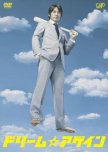
This light fantasy sums up best as a combination of sports and human drama. When main character Ogi Shunsuke rises again as Asahina Takaya, we watch him grapple with attempts to continue his dream (as a pro baseball player) while dealing with issues stemming from both his old life and new. But while Dream Again watches pleasantly as a whole, the script probably suffers most out of any other aspect. One must cling to suspension of disbelief a bit too much (even for a fantasy), with many a coincidence, cop-out, and shrug-off in between. At least when it comes down to the supernatural bit. Dream Again never commits the cardinal sin of being boring. It even does fine with emotional elements, so basically the “human story” portion is much stronger.
You know when something about an actor “just works”? Sorimachi Takashi embodies this idea completely. Blessed with serious star quality and magnetism, he brings up the cast rating on his own. I've long since grown tired of the earnest lead archetype, yet I easily gravitated toward Sorimachi’s character. My only complaint would be that sometimes it became obvious he struggled with failings in the script, though that’s understandable. Other highlights include lovely Kato Ai, a much grown Shida Mirai, and the surprisingly lovable Kodama Kiyoshi as Tanaka, the heavenly guide. He might be the cutest old man ever, seriously.
Most of the music in Dream Again makes its impression during emotional sequences. Softer instances were best, while the suspense theme was so silly it drove me crazy after the third play. The ethereal introductory theme stands out, as does Kobukuro’s yearning Aoku Yasashiku (roughly “Blue and Gentle”). Little else was memorable.
Was this review helpful to you?
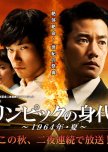
While I found the investigation aspect tight and fascinating, palpable suspense falls somewhat low. There was definitely an air of “racing against the clock,” but the actual culprit becomes apparent too soon. Nevertheless, learning about that person’s mindset and motivations retain interest. My attention often caught on the atmosphere built by the depicted time period; the clothing, cars, and social activities truly seemed accurate. And the feeling of a city ready to host the biggest sporting event in the world? That was well presented too, though the viewer’s time is spent primarily with the case. I would note that this SP leaves me with little desire to see it again; enjoying it once seems to be enough. Time will tell.
How about that cast? If one takes a quick peek at the listing, one might be taken aback at the sheer amount of star power contained there. Names such as Amami Yuki, Kuroki Meisa, Sawamura Ikki, and many more represent the supporting cast alone. Of the leads, we have Takenouchi Yutaka and Matsuyama Kenichi, both remarkable whatever the role. Matsuyama-san in particular performs with great energy and depth, though Takenouchi appears fresh-faced and blue-collar heroic. My only complaint would be how crowded the drama feels at times; it’s a little weird to see so many familiar and famous faces at once, even should they perform well.
Incidental music suits each scene nicely. Most offerings add something to the instance they are used in. Unfortunately, none are particularly memorable after the fact. This also accounts for the lack of vocal pieces, which typically add to score memorability.
Was this review helpful to you?

Dokushin Kizoku hearkens back to the days when Hollywood produced sparkling romances, and immortal beauties such as Audrey Hepburn led us through them. Though it might not evolve into a classic in its own right, this is a drama which channels cinema's golden era with gusto. Western viewers, as well as those who exalt in old films, will enjoy and understand its purpose best. But doubtlessly, those "old souls," among us will find something to love as well.
"Familiar" describes Dokushin Kizoku wonderfully, though without the negative connotations that word sometimes bears. So frequently one hears the hardened drama veteran lamenting a fine watch stooping to the "same-old, same-old." However, the devices used in the plot here are not cliches often seen in Asian film and dramas; they are rather western conventions, so far fallen out of use as to be refreshing. What results is a delightfully nostalgic romantic comedy with the flavors of East and West delightfully blended. And if you've heard this feels somewhat like King of Dramas, that would be true enough; just don't expect a remake or more than superficial similarities.
My most serious issue is that the romantic conflict became a pain around the ninth episode. Much as I loved the ultimate pairing, it eventually felt set in stone so the continual flutter around the subject was frustrating.
Another point of interest will be the awesome use of romance/marriage quotes used to preface each episode.
Kusanagi Tsuyoshi always struck me as one of the better actors to come out of SMAP; my observation stands. As the commitment-phobic director Hoshino Mamoru, he rises above the realms of two-dimensionality. By the end of the series, we have a clear portrait of a man with unique interests and solitary pleasures, a person who believes he's happy alone but doesn't realize he just hasn't met the right person yet. Ito Hideaki plays second lead and brother to Kusanagi-san, as Susumu. This character was well-realized too and felt like a real person, despite his over-the-top playboy reputation. Wrapping up the leads, we had the lovely Kitagawa Keiko; her Haruno Yuki might be one of my favorite leads from a romantic comedy in ages. She felt strong despite her romantic confusions. Her unique adoration of film and the script writing process really bolstered her likability.
The supporting cast was somewhat forgettable, though one or two portrayals were poor. This includes the awful Hoshino aunt, whose lines felt as though they were being delivered from a cue card. Sasai Eisuke, however, has a hilarious though brief turn as Susumu's divorce lawyer. Did I laugh out loud any time he appeared? You bet.
Much of what helps boost a film into iconic status is its soundtrack. Dokushin Kizoku adopts various themes from famous romance films, mostly shirking original tracks of its own. This added to the classic, beautifully dated atmosphere the drama exuded throughout its pace. Vocals from Breakfast at Tiffany's (Moon River) and Sleepless in Seattle (If I Fall In Love) are most memorable among these. Some viewers may not enjoy this, however; while following the drama, I did notice people expressing displeasure at the inclusions. And for SMAP fans, yes: they provided the theme song as always (Shareotsu).
Was this review helpful to you?

Kamo, Kyoto e Iku (Kamo Goes to Kyoto) belongs to an unusual subset of dramas. While a plot exists and the story is passably well-told, everything ends up feeling rather educational. We see the beautiful city of Kyoto, complete with its landmarks and various traditions. We see how the ryokan is run, right down to maid etiquette, ofuro cleaning, and the composition of kaiseki (traditional Japanese cuisine, a staple of these establishments). This aspect is much stronger than the script itself, though even that remains enjoyable if somewhat simple. And if you like themes of modernity vs. tradition, you may discover another layer of appeal.
Should you actively seek out knock-out performances, continue your search; this drama will not offer them. However, nobody does a poor job either; most characters are pleasant and, at the very least, reasonably acted. Matsushima Nao might be most memorable, headlining as Ueba Kamo: seasoned finance official and Kyoto anti-fan (she even hates her name, originating from the famous river which runs through that city). Her elitist portrayal is believable, as it is when she switches gears. The exploits of this character lead us through the events of the drama, and the operations of the ryokan itself. Though she also has a cute side, mostly shown through her morning exercise routine.
Music follows a similar tack as acting. Everything is suitable and works in most scenes, but very little stands out. However, Sheena Ringo provides the striking vocal theme ("Iroha ni hoheto" or "Even Blossoming Flowers") definitely worth listening to again.
I would mostly recommend this drama to Kyoto-lovers, or those seeking cultural enrichment. Coming into this drama for other reasons might lead to a lukewarm experience. Don't be discouraged though! Kamo, Kyoto e Iku might have a lot to offer potential viewers of any kind.
Was this review helpful to you?

What if I said Medical Top Team had a split personality? Several weeks ago, panicking network MBC announced a change in scriptwriters; whether or not a switch actually occurred is dubious. In any case, the focus and tone of the drama seemed to shift rapidly around the same time. What we began with was a somber medical offering, complete with meticulous operations and multitudes of jargon. Cases felt realistically engaging and hospital politics well-written and relevant. Character interaction possessed an understated, slow-burn potential, though most attention was paid to the overall workplace atmosphere. Viewers searching for something more technically sound, like me, would have enjoyed this to the end.
However, around midway, much more focus was placed on individual characters (including romances and personal drama). The result was a marked shift away from the surgical team element, which was sort of the entire point. Other stumblings include muddied simplification in hospital politics, plot-lines hastily handled, and character trajectory which sometimes felt pandering or out of line. Relationship evolution of and between certain characters became the worst offenders of this, especially within the last five episodes. Overall development was incredibly rushed, right up to the ending; little to no focus on romance suddenly becomes episodes without scalpels, but stuffed full of sudden hugs and almost-kisses.
Performances suffer inconsistencies as well, stemming from both issues with the script and fizzling chemistry between actors. This comes from a person with many favorites present in the cast.
For instance, Jung Ryeo Won plays a role lacking in everything from settled back story to likability; her presence can only be called wooden, which is *not* the standard for this talented actress. What worsens the effect is how little spark exists between her and either male lead, though particularly Joo Ji Hoon. Zero chemistry, there, platonic and otherwise. But on that note, Joo Ji Hoon manages to have the best portrayal and most consistent character in the series. Late episodes allowed him to show more range and were very kind to him, though the styling department never was. His work with Kwon Sang Woo (whom I found likable) and Jun Noh Min (twice now, after Five Fingers) was strangely fun to watch. Favorable mentions go to Alex Chu and Park Won Sang, while the huge amount of airtime enjoyed by Oh Yeon Seo will forever have me scratching my head. Her acting wasn't great though she very nearly eclipsed Jung Ryeo Won as female lead, a disappointment of itself: Dr. Seo needed the extra time.
Fine music stands tall as the best element throughout Medical Top Team. Most instrumentals are memorable and suit each situation well. There are also two very nice vocal pieces including the stirring "Firelight," (John Park) and catchy number "Can You Feel Me?" (Melody Day). Other positive highlights include an actual, modern hospital used in filming, deliciously bright color palettes used for sets and clothing, and sharp cinematography.
Was this review helpful to you?
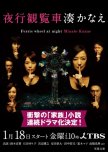
As implied above, Yakou Kanransha delves into the effects a shocking murder has on two families (and the town in which they live). It is an emotional story marked by highs and lows, much like the ever-rotating path the titular Ferris wheel follows. Other issues tackled over its course include bullying (by neighbors and classmates), ostracization, domestic violence, and societal pressure. Unlike many other Japanese dramas with such a focus, family is not held on a pedestal. Instead we're shown a realistically flawed structure, full of secrets and misunderstandings. Despite this, beauty remains to be found in the connection between friends, brothers and sisters, parents and children; something so imperfect can still be wonderful.
Most incredible might be how deftly these emotive aspects are combined with exciting, cerebral ones. Character development intermingles flawlessly with shocking revelations and startling secrets. Scenes are rarely lingered on; the pacing maintains a seamless stability throughout the series.
Japan excels at the ensemble piece; Yakou Kanransha boasts a large cast which more than lives up to this standard. Suzuki Kyoka clocks in a believable and solid performance as Endo Mayumi. This role is written simply so she might serve as our eyes into this fantastic circumstance; despite this, Suzuki-san completely brings her to life. Among the other adults, Yasuda Shota and Natsuki Mari are of great interest. Natsuki-san plays an especially polarizing part, yet her consistent and complex portrayal makes quite the impression.
But young actors Nakagawa Taishi (15) and Sugisaki Hana (16) completely steal the show. Both deliver honest and affecting performances beyond their years. Particularly Nakagawa-san; it floored me how drawn into his scenes I became as the series rolled along. Definitely a budding career to watch.
If like me, music comprises an important part of your viewing experience: take heart. Yakou Kanransha posesses an immaculate soundtrack, full of richly mysterious strings and hollow piano. There are also fine vocals, such as those from Ai (ending theme "Voice," which exudes action), and Reiko Oshima ("Daydreaming," a hopeful ballad with a bittersweet feel). Other highlights include the masterful use of sound effects; during particularly intense scenes, one can sometimes hear the grinding machinery and clacking carts of the Ferris wheel. Also take note of its use as imagery between scenes; you'll never forget the way it looks, brightly lit at night.
Was this review helpful to you?

Most media set during the Warring States period tend to pack on backstabbing politics, tragic romance, and lofty themes. Don't expect such things here. Little Big Soldier never attempts pretense, content to remain a straightforward buddy/road-trip fusion with a simple message. Its narrative follows a "small potatoes" conscript who has the luck to capture an enemy general. We mostly follow the pair in their dangerous trek across the Chinese wilderness, facing down nature and war-born troubles.
But the mood generally stays light. Continuing in the spirit of many Chan vehicles, even action sequences are infused with comedy. Add to this finely choreographed fights and appealing situations; the result is an amusing and fast-paced film, if an uncomplicated one. If issues exist, they manifest themselves within the last ten or so minutes. The outcome seems to betray the established mood of the film and (while groundwork for the ending is laid), it nearly takes the air out of the entire experience.
Jackie Chan may come to mind more for physical prowess, but his performance as the soldier is exceptional. Cowardly and street-smart, this character is startlingly deep and explored with careful maturity. Wang Lee Hom acts well and is believable as the general; though alone he does not sparkle, his chemistry with Chan is insanely dynamic. Any scene they have together is utterly wonderful; I would watch Little Big Soldier again for this aspect alone. Definitely watch this if you like bromance, unique action, and of course, Jackie Chan. Other highlights include: incredible scenery, sharp cinematography, and a cute blooper reel during the credits.
If you pay attention to music, the orchestrations are high quality. Of those that stand memorable, vocals by the lone female character and the soldier are best. I don't think I'll ever forget the lyrics, "a big road leads to my home," and perhaps you won't either.
Was this review helpful to you?
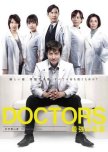
Surprisingly unique elements exist in this drama, including a twist on one of the above tropes. Sure, our hero is an idealistic newcomer (one with mad surgical skills), but his coworkers are unaware he is also a master manipulator. Beneath his smiling exterior and cheerful persona, this is a person constantly calculating how to position things to fall his way. Luckily, his "way seems to be improvement in the staff and hospital, despite the questionable methods sometimes employed.
As such, the plot revolves around the changes the manipulator (Dr. Sagara) tries to effect upon the broken hospital structure. Medical cases accompany these conflicts on an episodic basis, often with an interesting dynamic or social commentary (for example, in the fourth installment). But while the title refers to an "ultimate surgeon," and surgery is definitely an important part of any medical drama, the two aspects occasionally feel like a footnote to the workplace study.
Unfortunately, DOCTORS ends too soon. We commonly hear of dramas overstaying their welcome, but this series could have done with more time to solidify its premise and characters. This is especially true if watched as a standalone, though both a special and sequel exist.
In the role of Sagara Kosuke, then, we have Sawamura Ikki sporting an infectious smile and sharp charisma. Even as his character displays warmth toward patients and (sometimes superficially) his colleagues, Sawamura-san reserves something of himself. The effect is wonderful, allowing for Dr. Sagara to appear pleasant yet ultimately unapproachable. Another performance stands out, this one against reason: rival surgeon Moriyama Suguru, as portrayed by Takashima Masanobu. Immature and childish in every sense of the word, Moriyama actually becomes a highlight as the series continues. Takashima-san adds a quirky campiness and snappy timing which elevates his character from annoying... to hilarious.
Similar quirkiness carries over into the music as well. From the fun nostalgia of the upbeat violin, to the lumbering oddity that is Moriyama's theme, DOCTORS boasts a memorable soundtrack. However, it was not always to my taste (particularly the conflict anthem led by an electric guitar). The lone vocal felt somewhat awkward, with the usually spot-on JUJU covering the classic "Lullaby of Birdland."
Was this review helpful to you?

Love Will Tear Us Apart, as you may have garnered, takes a more realistic approach to romance. Shirking the wild pattern of outward conflict, it favors internal failings instead (such as insecurity and thoughtlessness). We see the start of the relationship only briefly, spending most of the film after Liang Liang and Miao Miao are established as a couple. For those that find worry in this, have no fear; we step into their lives as strangers, just as they do with one another, slowly becoming comfortable as they do. The story motion, though somewhat unconventional at times, eventually lends the impression of a real couple. Overall, most aspects felt natural and modern, so viewers may even see uncanny wisps of their own relationships (past and present).
What I enjoyed most about this film was the evolution of its tone throughout. Despite bearing a dismal title, Love Will Tear Us Apart actually kicks off surprisingly cute and funny. Many scenes with the leads are especially so, having been built to make invest one in the love story. But things become heavier gradually as the plot rolls along, and the viewer (though still rooting for both parties) starts to see undeniable cracks in this relationship. Something about the atmosphere just works and (if empathetic like me) one may come away feeling as though one had lived through all the love and pain themselves.
Both halves of the couple perform well, exhibiting vibrant chemistry.
As the charming (if somewhat typical) Liang Liang, Feng Shao Feng retains every drop of his amazing screen presence. His expressive eyes lend much to his performance; every emotion is lent credence, and one can almost see what Liang Liang is thinking. Despite the fact this character can be somewhat careless, it's almost impossible not to like and understand him. Playing adorable yet insecure Miao Miao, we have Ni Ni as his lover. Her performance is strong in the same ways as her co-star, but I must applaud the natural and interesting motions she adopted. Caring about Miao Miao was a must, though her behavior cannot always be condoned.
For cinematography lovers, shots are clean and clear. Many take on the feeling of an independent film, with occasionally artful choices. Some sequences even stand out, such as two parallels (you'll know when you see them); otherwise, though, nothing is terribly innovative. I did appreciate the color palettes though, especially in darker scenes. Music is similarly suitable, though without much in the way of tremendous memorability. Tracks for pivotal scenes were rather good, that said.
Was this review helpful to you?
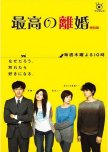
Though sometimes one may see it advertised as such, Saikou no Rikon cannot be called a true "romantic comedy". It watches more like a slice-of-life, centering around two couples (whose respective relationships may or may not be crumbling). The comedic aspect hits as often as it misses, despite passable delivery from involved actors and actresses. Emotionally rich and intense scenes outweigh these in sheer remarkability; in fact, the levity issues are approached with at times (such as the occasion divorce is brought up for one of the couples) actually leaves the whole product feeling a little inconsistent. Am I watching a zany Japanese relationship lark or this heavy treatise? Because some elements did not wholly jive (at least for me), those thoughts popped up frequently over the course of the series.
Where the drama excels must be dialogue, which is razor-sharp and surprisingly natural. These characters speak like real people, even showing pop cultural awareness. An engaging way speech is used is also in the way characters loose their frustrations to others; they tend to tell strangers and service-providers in these long-winded monologues, unable to vent to anyone closer. What it lacks in stunning backdrops and visual candy, Saikou no Rikon makes up for in thoughtful camera work. With a sharp focus on the inner workings of married life in mind, shots often adopt voyeuristic qualities. For instance, we might see an argument from a fly-on-the-wall perspective in the kitchen, overlooking the entirety of a small apartment made for two.
Eita headlines a solid cast, swinging all his powerful versatility behind the (initially) repellent Hamasaki Mitsuo. This is a character that embodies everything wrong in a husband, from his incredible pettiness to the selfish way he views most everything. The first time he tells his wife something between them was her "personal problem," even threw me back into some bad memories of my own. However, Hamasaki exhibits incredible personal growth throughout Saikou no Rikon (with Eita totally inhabiting the role). Ono Machiko, as his polar opposite and somehow wife Yuka, has a fantastic showing also. Whenever Yuka showed weakness or had something big to say, Ono-san knocked it out of the park. Her role, despite early episodes showing her through her husband's perspective, is lovable and sympathetic; women will definitely identify with her best.
Ayano Go and Maki Yoko portray strange duo Ryo and Akari, whose tale most interests at first glance yet slowly is overcome by that of the main couple. Both are fine actors and do beautifully in their scenes. Unfortunately, paired with the "that's just how things are" attitude the characters take to one another and themselves, the too-fast wrap to their story leaves the entire relationship a little hard to watch and slightly unsatisfying to finish (unlike that of the main couple).
If Saikou no Rikon is a hero wielding dialogue as its best weapon, music will be its Achilles Heel. Having just come down from a marathon of the series, I can scarcely remember any specific tracks. There was at least one quirky instrumental number, but the only truly memorable song is ending theme "Yin Yang" provided by the amazing Kuwata Keisuke. Despite not being a song to my taste, it suits the drama exceedingly well. And that wild ending sequence that accompanies it? Positively awesome.
Was this review helpful to you?

Focusing on fallen warlord Hou Jie, the film turns its lens on this era. But more than a mere period piece or war film, Shaolin stands apart with its message uniquely infused with teachings of Buddhism. Concepts of karma and interconnection, love conquering hatred, peace trumping war, the importance of redemption and compassion, are enfolded by the story. Subtle symmetries are worked into the events of the plot, leaving the viewer much to feel and consider. My only issue would be that many characters seem more like symbols than actual people. However, this is forgivable in light of what they are meant to represent (and because one often ends up caring for them either way).
For those concerned about martial arts, they are more than present. Shaolin takes care to balance gentler sequences with ample action, showcasing weighty and finely-choreographed fights. You won't see slow motion or "wire-fu" here -- well, rather sparing amounts of the latter.
Andy Lau performs to the lofty standard assured by his name. For Shaolin to work as intended, whomever played Hou Jie needed to portray various elements believably. From the ruthless yet fatherly leader to a broken man seeking forgiveness and transformation -- Lau rises to the task, striking every chord. On the other hand, we have Nicholas Tse as duplicitous subordinate Cao Man. Cutting a dashing figure in his military uniform, this is an actor who brings power to a role much less developed than that of the lead. Though it should be easy to hate his villain, Tse effortlessly draws understanding (and better yet, the eye of the viewer) toward Cao Man.
Jackie Chan also appears in adorable cameo as the cooking monk, Wu Dao. His is a more than welcome guest appearance, delicate in inclusion yet still notable.
The best component of Shaolin might be its music. Gorgeous, sweeping orchestrations elevate each instance in which they're played. Most memorable among these auditory pleasures is the collaboration between composer Nicholas Errèra and Andy Lau: vocal "Wu (Enlightenment)". With a prayer-like intonation and the thoughtful lyrics penned by the actor himself, it is a song likely to stay with the viewer long after the film has ended.
Was this review helpful to you?

